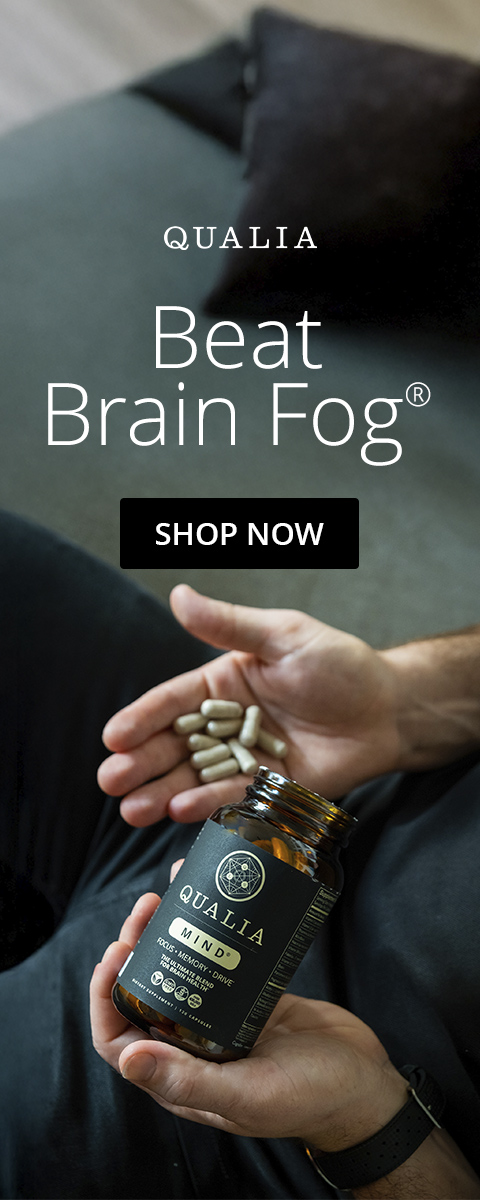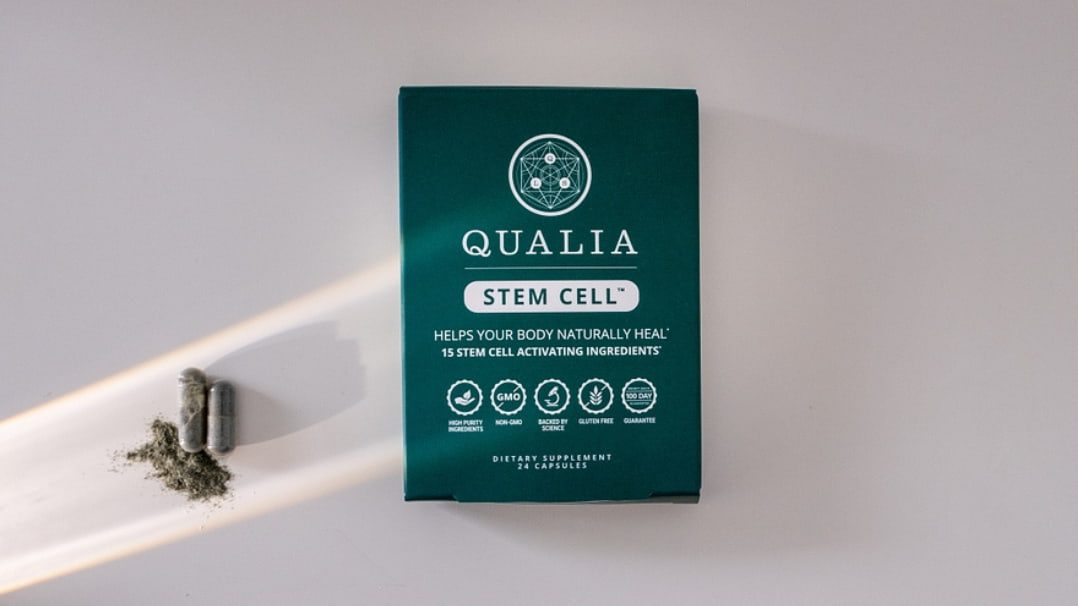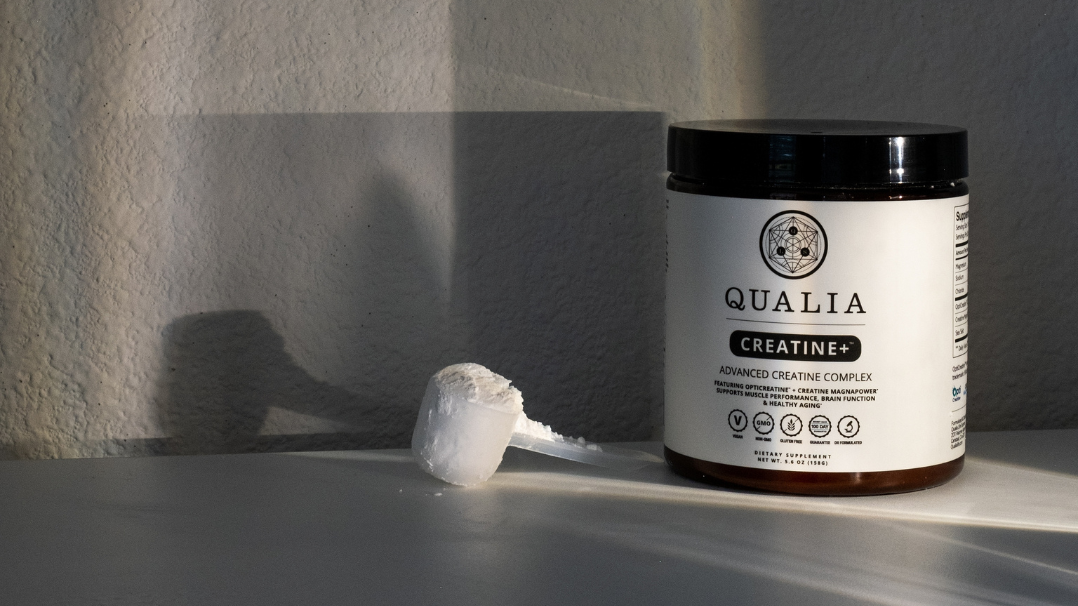We’re launching a new and improved Qualia Mind®! As we did with Qualia Life® 2.0, Qualia Mind 2.0 builds on and improves upon the original version while keeping the backbone of the formula the same. We’ve been keeping track of the feedback we receive from our community, the latest research, and new ingredients made available since we first launched Qualia Mind: we took this and more into account when we designed this upgrade.
Our goals for Qualia Mind 2.0 were ambitious. We wanted to make a great nootropic even better. We wanted to find out if we could succeed in doing this with fewer capsules. We wanted to add nutritional support for brain areas that were not as well supported with the original Qualia Mind, such as hearing and vision.* This required more than simply making slight changes to what’s in Qualia Mind; it was a more extensive reformulation. We added 13 new ingredients. To make room for them, 8 ingredients needed to be removed, and the amounts of several others changed, with some increasing and some decreasing.
We put the new formula to the test, comparing it to Qualia Mind 1.0. Qualia Mind 2.0 performed better.* We are proud of what we accomplished with Qualia Mind 1.0, but we’re even prouder of Qualia Mind 2.0.
Here’s what’s changed and why.
Qualia Mind 2.0 Has More Ingredients in Fewer Capsules
One of our goals was to decrease the number of capsules in a serving of Qualia Mind without compromising quality. We know that taking so many capsules can be fatiguing for some people—it’s a comment we get a lot. But the fact is that what we see as the defining feature of Qualia Mind—a comprehensive support of neural pathways and processes that promote brain health and cognitive performance—is contingent on supplementing a high number of ingredients. To be able to target so many different aspects of brain function and performance, we need sufficient amounts of the ingredients that do so—and that inevitably means a relatively high capsule count.* Decreasing the number of capsules was not an easy task given our formulation approach, but we pulled it off! That balance between practicality and depth of support is a big part of what makes Qualia Supplements different. Our goal isn’t just to reduce capsule count, but to do it while still honoring the complexity of the brain and the multiple pathways involved in cognitive performance.*
In fact, in Qualia Mind 2.0, we managed to decrease the number of capsules per serving from 7 to 6, while also increasing the number of ingredients from 27 to 32. That means added benefits in fewer capsules!*
Qualia Mind 2.0 Has More Trademarked Ingredients
The number of branded ingredients in Qualia Mind has increased from four in Mind 1.0 to eight in the new and improved Mind 2.0!
Branded ingredients are ingredients that a supplier has gone to the effort and cost of trademarking. This is typically done to associate the brand name of the ingredient with claims of specific health benefits or higher quality. Often their development involved significantly more research and expense than non-trademarked (i.e., generic) ingredients. Because of the high R&D investment, branded ingredients are usually more expensive than generic ingredients. But the extra cost can be worth it because sometimes they are just that much better.*
Having more trademarked ingredients is one of the ways the new Qualia Mind delivers even more value to you.*
We Included Up-and-Coming Nootropics
In the 6 plus years since Qualia Mind 1.0 launched, science has continued its march forward. There’s been new research. Some ingredients have appeared on the market that weren’t available before. Self-experimentation and N of 1 use has given insight into use of some nootropics and how they combine with other ingredients. Put simply, the nootropic community has not been static; we did not want Qualia Mind to be either.
We consider ingredients like Nutricog® (a Terminalia chebula fruit extract and Boswellia serrata gum resin extract), Sabroxy® (Oroxylum indicum bark extract), and Polygala tenuifolia Root Extract as being rising stars in the nootropic community. We’re confident these ingredients will become more popular as more people learn about and experience them. You get to experience them today in Qualia Mind 2.0.
We Brought Back Some Old Favorites
Before Qualia Mind, there was Qualia—the first nootropic formula we launched went by the name Qualia. It was supplied in two bottles, with instructions to take capsules from one of the bottles away from food first thing in the morning and capsules from the other bottle with breakfast (or food). This was a bit complicated for some people. This two-bottle formula was also a lot of capsules, with a full serving size of 11 capsules between both bottles.
To get from the 11 capsules in original Qualia to the 7 in Qualia Mind 1.0 required removing some ingredients. Lion’s Mane extract was one of these removals. Magnesium was another. Both ingredients offer support for a healthy brain. Both are also among the nootropic communities favorites.* We’re excited to be able to offer both again as part of Qualia Mind 2.0.
We Included “Underappreciated” Nootropics
Nootropic ingredients can be thought of as some being underrated (they don’t get enough credit or appreciation), some being properly rated, and some being overrated. The overrated nootropics get used a lot; maybe more than they deserve. The underrated ones get overlooked. We wanted to correct this in Qualia Mind 2.0.
After reviewing an extensive amount of research and following what real world users experience, we think a strong and compelling argument can be made that Lutein and Zeaxanthin (supplied as Lutemax® Brain), Saffron, and Boron fall into the underrated category. They’ve been included in Qualia Mind 2.0. And, despite Celastrus paniculatus Seed Extract having been in Qualia Mind since it was first launched, we consider this as being another underrated and underappreciated nootropic—it’s on the very short list of our favorites. In Qualia Mind 2.0, we increased the amount of Celastrus by 50% (from 60 to 90 mg) and include it as SmartSeed™, an extract that is made specially for us.*
We Added More Brain-Essential Nutrition*
Brain nutrients are compounds naturally found in the brain and used to support its structure and function. Qualia Mind 1.0 had 17 brain nutrients; Qualia Mind 2.0 has 21.*
Qualia Mind 1.0 included most of the B complex vitamins, but Qualia Mind 2.0 supplies them all. So in addition to the B vitamins already found in Mind 1.0—Thiamine (as Thiamine HCl), Niacin (as Niacinamide), Pantothenic Acid (as Calcium Pantothenate), Vitamin B6 (as Pyridoxal 5'-Phosphate), and Vitamin B12 (as Methylcobalamin)—Mind 2.0 also includes Riboflavin, Biotin, and Folate (as L-5'-Methyltetrahydrofolate Calcium). Every B vitamin is either a cofactor or a precursor for a cofactor in a key metabolic process and all have essential roles in cellular metabolism, energy production, and brain health.*
We also added two minerals involved in brain function to Qualia Mind 2.0: Magnesium (as Magnesium Aspartate) and Boron (as Boron Glycinate). Finally, we added the macular carotenoids Lutein and Zeaxanthin (from Lutemax® Brain), which are found in high amounts in the retina and the brain where they have antioxidant defense functions.*
We maintained the neurotransmitter precursors L-tyrosine (as N-Acetyl-L-Tyrosine, for dopamine support), Citicoline (as Cognizin®), Alpha-GPC (both for acetylcholine support); the membrane phospholipid Phosphatidylserine; the brain amino acid neuromodulator Taurine; the mitochondrial nutrients Pyrroloquinoline Quinone (PQQ) and Acetyl-L-Carnitine; and the antioxidant and neuroprotection-supporting vitamins Vitamin C (as Ascorbic Acid) and Vitamin D (as Cholecalciferol from VegD3®).*
We removed DL-Phenylalanine (an amino acid and dopamine precursor that had some redundancy with N-Acetyl-L-Tyrosine), Docosahexaenoic Acid (DHA, an omega-3 fatty acid found in membranes), and Uridine Monophosphate (a nucleotide that participates in the phosphatidylcholine synthesis pathway) (see why below) to make room for the new ingredients and as part of the solution to fewer capsules.*
Qualia Mind 2.0 Has More Cognitive Support*
Qualia Mind 2.0 provides upgraded support for several aspects of cognitive performance.*
We upgraded memory support in Qualia Mind 2.0 by increasing the amount of Ginkgo biloba Leaf Extract from 50 mg to 120 mg. The increase to 120 mg matches an amount commonly used in clinical studies where Ginkgo has supported memory (and other aspects of cognition) in both older and younger adults. We also added Lutemax Brain Marigold Flower Extract, a source of the macular pigments Lutein and Zeaxanthin. These macular pigments, in general, and Lutemax specifically, have supported memory and markers of neuroplasticity in clinical studies. Furthermore, we added Nutricog®, a blend of Terminalia chebula Fruit Extract and Boswellia serrata Gum Resin Extract that supports memory as well as learning rate and capacity—this added support for learning is a new addition to Qualia Mind.*
In addition to supporting cognitive performance, Ginkgo biloba also has adaptogenic actions—it supports healthy stress responses and a calm mood. Therefore, by increasing the amount of Ginkgo biloba, Qualia Mind 2.0 also upgrades its support of cognitive performance under stress. This upgrade was reinforced by adding Polygala tenuifolia Root Extract, another herb that supports healthy stress responses. Further contribution to this upgrade comes from also increasing the amount of Rhodiola rosea Root Extract, a well-known adaptogenic herb, from 300 mg in Qualia Mind 1.0 to 370 mg in Qualia Mind 2.0. This increase in the amount of Rhodiola rosea adds more support for mental energy and resistance to mental fatigue, further contributing to supporting the capacity for mental work under stress or fatiguing circumstances.*
We Added Support for Vision and Hearing
Vision and hearing are important for cognitive performance and maintaining cognitive health. Therefore, we wanted to include support for these key functions in Qualia Mind 2.0.
One of the main factors contributing to the deterioration of visual health is oxidative stress in the retina. The blue light emitted by screens is an example of an eye stressor. We added Lutein and Zeaxanthin (as Lutemax Brain Marigold Flower Extract) because these are antioxidant pigments that absorb excess blue light. These pigments accumulate in a central area of the retina called macula (which is why they’re called macular pigments or macular carotenoids). Lutein and Zeaxanthin must be obtained from the diet and adequate dietary levels are essential for a healthy visual response to blue light.
We also included Saffron Stigma Extract because it provides eye-healthy carotenoids and supports antioxidant defenses in the eye, retinal function and health, and visual acuity. Two ingredients that were already part of Qualia Mind 1.0 also support vision: Vitamin B12 as Methylcobalamin supports healthy nerve function and may help to support optic nerve health, which carries visual information to the brain; and Taurine is the most abundant amino acid in the retina, where it is essential for the light-capturing function of photoreceptors, acts as an antioxidant, and supports protection against stress from blue light and ultraviolet light.*
Taurine is also found in the cochlea, the part of the inner ear involved in hearing, where it supports auditory neurons, neuroprotective functions in the cochlea, and auditory health. In Qualia Mind 2.0, we added magnesium as Magnesium Aspartate because it is a form that has been used in several clinical studies for supporting healthy hearing and resilience from noise stress. Pyrroloquinoline Quinone (PQQ) also offers support for hearing (read about vision and hearing support in Qualia Mind: The Building of a Nootropic Stack).*
We Created a Caffeine Stack
We increased the amount of caffeine from 90 mg to 100 mg. We made this increase because 100 mg of caffeine is an amount commonly used in studies of cognitive performance. This amount remains within the middle of the nootropic range, but you may feel a bit more support for alertness and processing speed. Most importantly, we switched from all of the caffeine coming from Coffeeberry® Whole Coffee Fruit Extract to a caffeine blend of Coffeeberry, Guarana Seed Extract, and Caffeine Anhydrous. The goal was to include a blend of caffeine sources that may be experienced slightly differently because of the other compounds each ingredient also provides. Caffeine anhydrous supplies just caffeine to provide the quick feeling of energy and alertness we expect from it. Extracts from whole coffee fruit (Coffeeberry®, i.e, not just the beans used to make coffee, but the whole coffee cherry that surrounds the bean) and guarana seeds supply caffeine and are also sources of health-promoting polyphenols.*
What Was Removed and Why?
Improving Qualia Mind meant adding new ingredients. These new ingredients were competing for the capsule space with existing ingredients. Improving the formula, while also decreasing the number of capsules, meant the competition was fierce. Put simply, some of the ingredients that were in Qualia Mind 1.0 were outcompeted. It doesn’t mean we don’t like these ingredients, but to add the upgrades we made, some ingredients needed to be subtracted.
Docosahexaenoic Acid (DHA) was removed for a few reasons. DHA is responsible for a mild “fishy” smell in Qualia Mind 1.0 that many customers have commented on—removing DHA solves that issue. Similar to Qualia Mind 2.0, the competition for capsule space in Mind 1.0 was fierce. Because of this competition for capsule space, while we included DHA in the original Qualia Mind, we were only able to fit a modest amount in a serving. As a company, we strive to ensure that, when an ingredient is used in a formula, the amount is sufficient. The amount of DHA being included may not have been living up to this standard, so that was another reason that weighed into removing it. A third reason for removing DHA was because it is not an ingredient that would be expected to support short-term nootropic benefits—you often need to take it daily for a long time before cognitive effects are experienced. DHA was included in Qualia Mind 1.0 as an investment in long-term brain health. DHA is the most abundant omega-3 fatty acid in the brain, where it is a main structural component of the neuronal cell membrane and supports cell signaling functions. We concluded that we could maintain membrane structural support with our existing and new ingredients, many of which have antioxidant properties that support the protection of membranes against oxidative stress, one of the main threats to membrane health.*
Uridine Monophosphate was included in Qualia Mind 1.0 in large part because of studies where it had been complementary with DHA. Its roles in the original formula were related to support for choline levels and brain membrane phospholipids. We decided to remove Uridine Monophosphate for a few reasons: First, Qualia Mind includes two ingredients that provide a more direct support of choline levels—Alpha-GPC and Citicoline as Cognizin®—so we felt we had that covered. Second, following ingestion, citicoline yields choline and cytidine, with some of the latter being converted into uridine in humans, so we still have some indirect uridine support in Qualia Mind 2.0. And finally, in preclinical studies, Uridine Monophosphate was often combined with DHA, and the combo was shown to support memory. So we felt that removing DHA could impact the benefits of Uridine Monophosphate. Furthermore, although Uridine Monophosphate is a nootropic ingredient appreciated among neurohackers, it is still poorly studied at the clinical level for cognitive support.* After weighing these factors, we felt that the capsule space taken up by Uridine Monophosphate could be better used by ingredients with stronger evidence of cognitive support (read about choline support in Qualia Mind: The Building of a Nootropic Stack).
DL-Phenylalanine, N-Acetyl-L-Tyrosine, and Mucuna Pruriens Seed Extract (a source of L-DOPA) were included in Qualia Mind 1.0 to support the dopamine synthesis pathway which progresses from L-Phenylalanine → L-Tyrosine → L-DOPA → Dopamine. Our goal was to provide all three precursors for full dopamine synthesis pathway support. For Qualia Mind 2.0, we decided to focus specifically on the rate-limiting step of the pathway, i.e., the step that determines the rate at which dopamine synthesis progresses: the conversion of L-tyrosine to L-DOPA by the enzyme tyrosine hydroxylase. Because this step can act as a bottleneck in the pathway, we figured that increasing the support for this step could be as beneficial as providing all the precursors (if not more beneficial!). Therefore, we removed DL-Phenylalanine and Mucuna Pruriens from the formula and maintained only the precursor used in the rate-limiting step: L-tyrosine (as N-Acetyl-L-Tyrosine); we also upgraded our support for the activity of the rate-limiting enzyme by increasing the amounts of two ingredients that support it—Rhodiola rosea Root Extract and Ginkgo biloba Leaf Extract—and adding another—Saffron Stigma Extract. And to further increase dopamine support in Qualia Mind 2.0, we added ingredients that promote the availability of dopamine in synapses and neurons by supporting balanced dopamine reuptake and breakdown (which Rhodiola and Saffron also support), including Oroxylum indicum bark extract (as Sabroxy®), Polygala tenuifolia Root Extract, and Terminalia chebula Fruit Extract (in Nutricog®).*
Bacopa monnieri Extract, which was included in Qualia Mind 1.0 primarily to support cognitive function and mood, was replaced in Qualia Mind 2.0 with Nutricog®, a blend of Terminalia chebula Fruit Extract and Boswellia serrata Gum Resin Extract. The clinical study with Nutricog® indicates that it may provide stronger benefits for memory and learning, support a wider range of cognitive areas, and provide noticeable cognitive support in a shorter time frame.*
One of the great benefits users of Bacopa often report is its adaptogenic properties and ability to foster a feeling of calm and thereby support cognition in contexts of stress. To ensure that Qualia Mind 2.0 not only maintains that benefit but actually upgrades it, we increased the amount of our main adaptogenic ingredient: Rhodiola rosea Root Extract. We also increased the amount of Ginkgo biloba Leaf Extract and added Polygala tenuifolia Root Extract and Terminalia chebula Fruit Extract (in Nutricog®), which have all been shown to support adaptogenic mechanisms.*
Artichoke Leaf Extract and Coleus forskohlii Root Extract were included in Qualia Mind 1.0 as a combo to support long-term potentiation (LTP, a neural mechanism of synaptic plasticity involved in learning and memory) by supporting cyclic adenosine monophosphate (cAMP), an intracellular signaling molecule (through Coleus) and phosphodiesterase-4 (PDE4), the enzyme that hydrolyzes cAMP (through Artichoke), as both molecules are involved in LTP. This benefit is only hypothetical and based on in vitro studies with each extract showing the referred mechanisms of action; there are no studies showing that their combination does indeed promote LTP. This does not mean it doesn’t, but because there’s no scientific evidence to support it, we decided to remove Artichoke and Coleus forskohlii and replace them with ingredients that have actually been shown to promote LTP in preclinical research: Saffron Stigma Extract, Polygala tenuifolia Root Extract, and Lion’s Mane Mushroom (as RealLionsMane™). Supporting LTP is a means to an end. The end, in this case, is optimal learning and memory. We thought it made sense to focus more attention on the “end” rather than the means to the end, which led to an ingredient that has been shown to support learning and memory: Nutricog® (Terminalia chebula fruit extract and Boswellia serrata gum resin extract).
Huperzia serrata Leaf Extract was included in Qualia Mind 1.0 because it is a source of Huperzine A. The purpose of this ingredient was to support acetylcholine signaling. Qualia Mind 1.0 included another ingredient that had a similar role, Celastrus paniculatus. In Qualia Mind 2.0, we increased the amount of Celastrus and, importantly, we have our own new trademarked Celastrus paniculatus Seed Extract: SmartSeed™, developed for Qualia Life. Furthermore, three of our new ingredients have also been shown to support acetylcholine signaling: Polygala tenuifolia Root Extract, Terminalia chebula Fruit Extract (in Nutricog®), and Saffron Stigma Extract. With all of this additional support, we felt that Huperzia serrata Leaf extract was no longer needed in our formula.*
*These statements have not been evaluated by the Food and Drug Administration. This product is not intended to diagnose, treat, cure, or prevent any disease.

 Written by
Written by






